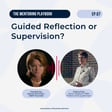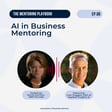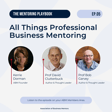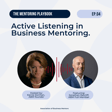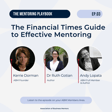Become a Creator today!Start creating today - Share your story with the world!
Start for free
00:00:00
00:00:01

The difference between mentoring & coaching
Welcome to the ABM Mentoring Playbook!
During this first episode of the ABM Mentoring Playbook podcast, ABM founder Kerrie Dorman discusses the key differences between mentoring vs coaching with ABM Director Tim Anderson.
Discover two downloadable resources for this episode on your ABM Member portal.
For any questions, please get in touch via enquiries@associationofbusinessmentors.org
Recommended
Transcript
Introduction to ABM Mentoring Playbook
00:00:01
Speaker
Hi, welcome to the ABM Mentoring Playbook. This is your podcast on all things mentoring, tools, techniques, and best practices. I'm your host, Kerry Dorman. I'm the founder and chief ambassador of the Association of Business Mentors. And every month I'm going to be speaking with an expert guest about a specific tool to help you elevate your mentoring practice.
Mentoring vs Coaching: What's the Difference?
00:00:26
Speaker
So without further ado, let's crack on to this month's episode.
00:00:31
Speaker
As our first guest, I'd like to welcome Learning and Development Director, Tim Anderson. Tim, how are you? Yeah, fabulous. I'm really looking forward to the conversation this morning and I guess, privileged to be one of the first guests.
00:00:47
Speaker
Yes, the very first, absolutely, as you should be. And so, Tim, today we are going to explore the age-old question of what is the difference between a mentor and a coach? And this is something that I'm asked very frequently and I know that you are too. So what are your views? What are our views? Well, I think there are distinct differences and we'll probably explore those
00:01:16
Speaker
as we progress the conversation. But I think they fit quite closely into a spectrum of development. We think about how people learn, how they interact with learning materials, etc. We go from just perhaps reading a book, going on training courses, maybe going on formal training courses, education through colleges, universities, etc.
Practical Applications of Mentoring and Coaching
00:01:44
Speaker
But none of that really comes alive until we try and apply it. So particularly for adults, I think, and people that are doing work based learning things or because they've got hobbies or the like, we can see or get some instruction by reading a manual or watching a video or the like. But then the real way that we learn that is going out and applying that. I think we're coaching and mentoring fits in.
00:02:14
Speaker
And this is where they're sort of close cousins, if you like. I think where they fit in is helping the individual take the information that they've gleaned from their training in development or reading or whatever activity they're going through, and then trying to apply that in a work circumstance.
00:02:37
Speaker
Yes, great. Well, that's a brilliant insight into the start of how we do learn and apply ourselves. So now onto the coaching and mentoring differences. What would you say? How would you describe a coach?
International Coaching Federation's Competencies
00:02:55
Speaker
Well, I think if we look at coaching, I'd like to particularly pick out a couple of the competencies from the International Coaching Federation.
00:03:07
Speaker
to try and explain where I see the differences are. Very much the ICF, the Ancestral Coaching Federation, is about coaching. And they've got eight particular elements to their framework, and two in particular. One is about evoking awareness. And so this talks us through how a coach would work, sit alongside as a thinking partner,
00:03:35
Speaker
using things like questioning, listening, just to evoke awareness. And what they're doing is facilitating the client's growth by supporting that person's awareness. So this is quite a strict process. And I think the difference between that and mentoring is that as a mentor, if I were looking for you to mentor me,
00:04:04
Speaker
Kerry, I'd be looking for you to perhaps
Mentorship: Sharing Experiences and Networks
00:04:08
Speaker
share some more experience, some of the experiences you've had. It may not be identical to what my circumstances are, but I'd benefit from listening to your experience. I might expect you to be able to introduce me to a few people from a network perspective, people that you know, people that could support me in perhaps business or in life.
00:04:33
Speaker
And so I think there's a difference there in terms of what we're doing as a mentor, extending the support to be able to make the entire environment effective. Whereas with a coach, very specifically, using questioning skills and the like to evoke awareness.
00:04:55
Speaker
So that is a key difference, isn't it? I suppose right there, that the coaching really using key questioning skills that normally takes quite a long time to study, learn and become qualified in. Now you are a qualified coach, Tim, aren't you? Yes, that's right. I've practiced both coaching and mentoring.
Fluidity & Client Service in Mentoring and Coaching
00:05:21
Speaker
And do you, do you flip between the two when you're working with someone? Um, yeah, absolutely. And quite often we get sort of caught up in this, am I a coach? Am I a mentor? Should I be doing coaching? Should I be doing mentoring? Um, well, I think that the beautiful thing about this is a dance, if you like, it's being able to, if we, if we look at being a master coach or master mentor,
00:05:51
Speaker
It's being able to be in service of our clients and recognize what the client needs. So somewhere in there, the way that I see getting around this is through contracting. And when we talk about contracting, it's being in service of our client. And the way to flip between that I've seen effective is it is just asking, hey, Mr. Client, would you mind if and inviting them
00:06:21
Speaker
to see if perhaps there's an alternative approach that we should take in that instance. So what if somebody doesn't have the coaching qualifications like you do and they worry about whether they are going into perhaps what might be coach mode but they don't really know because they haven't studied it? What would you say to that? Well I think this, rather than just looking at this purely from a study point of view, I think there's
00:06:49
Speaker
a case of having some skills, but also then we need to become, so it's not just about doing some coaching or doing some mentoring, it's about becoming a coach or becoming a mentor.
Mastering Mentoring and Coaching as a Craft
00:07:01
Speaker
This is a massive but subtle difference. Now, this is about experimentation, it's about practice. If we become a musician, for example, we could probably learn to play the guitar, but in order to master,
00:07:19
Speaker
the guitar, we'd have to practice, practice, practice. And I think this is the the ability of the the senior practitioners and mentor as a coach is because they're practiced, practiced and practiced. And sometimes when we don't do some coaching or mentoring for a while, it can become nasty. So it's about keeping this coaching or mentoring ability well oiled, well groomed,
00:07:47
Speaker
and well-practised. Yes, I couldn't think of anything worse than a rusty mentor. I like that analogy. So I think the message really is we have to practice, practice, keep at it, refine, hone our skills in both disciplines, but not get too hung up about whether we are actually coaching or mentoring. Is that the message that we're giving here, Tim?
00:08:13
Speaker
I think it's about being in support. So yes, this is the message that I try and share with people that I am training in coaching and mentoring. It's about relaxing and enjoying. If we're too concerned, if we're too anxious, we're more concerned about our anxiety than actually supporting a client.
00:08:36
Speaker
So yes, indeed. Yeah, I totally agree with that. And I love your, your, your constantly referring to the fact that we should be having fun whilst we're coaching and mentoring, which I absolutely agree with. Now, just going into a few of the practicalities around time.
00:08:52
Speaker
So I'm asked how long should a relationship last? So I'm predominantly a mentor and I'm asked how long should a mentoring relationship last for, as opposed to a coach? And what would you say to that?
Duration & Direction in Mentoring Relationships
00:09:08
Speaker
Well, I think there's two answers to this. Firstly, there's something about the formal relationship. If we're doing professional mentoring somewhere, there's a contract.
00:09:19
Speaker
somewhere there's a timescale, somebody's paying a bill. So we need to be aware of that element. But equally, how can we be in service of a client? Because I've seen people absolutely just at the drop of a hat within a split second, suddenly they've got it. Suddenly the penny's dropped.
00:09:47
Speaker
and therefore you could say a successful coach or a successful mentor could achieve all they're ever going to achieve with that client with just one word. However, we have a expectation of going into five, six, 10 sessions or whatever our thoughts are. So what's the length? What's the time? I think it's what's appropriate in order to achieve
00:10:16
Speaker
what the outcomes are, but both coaching and mentoring need to have a direction. Otherwise, they're just lovely conversations, lovely relationships. But if we're formally providing coaching or mentoring, there's got to be a destination, a place where we're going to arrive. What's the length of time of that? Depends on the complexity of the challenge. Would it always be the same professional?
00:10:45
Speaker
maybe not, maybe the recipient, the coachy or the mentee would be wise to look at several different suppliers at different parts of their journey.
00:11:01
Speaker
Yeah, so seeking, like in the States, they have a formula, I love this phrase, they have a formula of coaches and mentors to be able to help, guide and support in various different areas, skill-based, experience-based. I think that's very healthy. So for me, I think when I'm mentoring, I'm
00:11:21
Speaker
I'm always very aware of being able to deliver value. And the minute that I feel that I'm not doing that, I feel should be the indication of the start of a wrap-up of a relationship. And sometimes in the past that has just been one session. And for others it's been, well, I think my longest is five years.
00:11:47
Speaker
So I think you're absolutely right. It's not a one size fits all. It's completely unique to the individual. Now, what about insurance, Tim, as we are operating professionally?
Professional Necessities: Insurance for Mentors
00:11:59
Speaker
Do both coaches and mentors need insurance? I think most of the contracts that I've had formerly have asked for that. But I think there is a necessity to be careful to
00:12:16
Speaker
the risk adverse. If we're going in as business mentors and there's influence, it's probably wise to have insurance because there could be influences that you've made that stimulate a direction for the individual. And if that's incorrect, they could be of the mind to come back and blame you.
00:12:47
Speaker
So I think it's a wise situation. There's also the legal aspect sometimes, and this is where, particularly if you're an accountant and the like, where do things like shadow directorships come into this and play a role. So it's a, it's a minefield really.
00:13:10
Speaker
Yes, I was just going to say that some time ago one of our members did have a very terrible ending to a mentoring relationship and did end up in court and thankfully his insurances were intact. But I believe I know that here at the ABM if we're operating professionally then we have to have
00:13:32
Speaker
insurance. I just wondered whether there must be the same for coaches. But I don't want to dwell too much on that. That's interesting and I think a good word
The Dangers of Giving Advice in Mentoring
00:13:42
Speaker
of advice. And with that word advice, there's a lot of discussion around whether coaches give advice, whether mentors give advice, and what's your view on that? Well, I think we need to be careful with advice.
00:14:00
Speaker
I can't remember which one of the Greek philosophers it was, but there's something saying, we never swim in the same river twice. What do I mean? So we dive in one day and the rivers flowed on, the fish have all flowed by. Yesterday it was raining, today it's sunny. The leaves are out on the trees at this time of year. They won't be in the winter. The circumstances are never the same. So I may have had an experience
00:14:26
Speaker
But if I share that experience, it's just sharing that experience. If I share that as advice, the context is different. So I think it's very dangerous to give advice, but I think we can provoke thought and share experiences and help the individual then. If we can create awareness and give them options, then they're able to take better decisions
00:14:55
Speaker
as a result of the information they're cleaning.
00:14:58
Speaker
Yeah, I agree with that. However, I'm sure you have been in the same situation as this, where I've been specifically asked advice by my mentees, as in, Kerry, what would you do in this situation? So it's very difficult not to draw upon all the experiences that we've amassed in order to say, well, this is what I would do, isn't it? But that's not really what mentoring is. And I think that what you're getting at is to
00:15:25
Speaker
make sure that they're aware of all the options and because we have the insight and the experience, we can go through all the options and then the buck stops with the mentee and they have to draw their own conclusions, make their own decisions and move forward based on that. Would you agree? Yes, but I also think if we're telling people what to do, there's introducing that person's options and also they don't really
00:15:55
Speaker
own and invest in the direction. I think if anyone's ever had a stroppy teenager, you can say, look, we're doing this. Come on, do this. Get ready. Hurry up. And they'll just mull around. However, if you approach, we would say, hey, we're going into town. Would you like to wear your blue shirt or your red shirt? Suddenly you're giving them options and they actually put the one that they think they want on and come and join you on that expedition.
00:16:25
Speaker
Ah, yes. Well, I've had a few of those particular situations, which is why I'm giggling. But yes, not that we're likening mentees to stroppy teenagers. Let's make that clear. Brilliant, Tim. Well, this has been extremely interesting. And I think we've got to the bottom of what the difference is between a mentor and a coach.
Summary Tool on ABM Website
00:16:48
Speaker
To go alongside this podcast, we do have a downloadable
00:16:52
Speaker
tool, which is on the ABM website, and hopefully should just have encompassed everything that we've just spoken about in a nutshell on a PDF. But that's great. And thank you very much for joining me today. Have you got anything else that you would like to add? Like, for example, what's in terms of learning and development, what's in the pipeline?
00:17:19
Speaker
Well, I think the thing that I love about the position that I'm holding here is that I can support individuals becoming fabulous, fabulous mentors.
ABM's Learning Initiatives
00:17:31
Speaker
And we do that a number of ways. We've obviously got the formal pathways with the accreditations, the ILM pathways, et cetera. But not everybody's looking to dive into a long term sort of level seven
00:17:49
Speaker
18-month expedition to get qualified. So what we're trying to provide to support our members are micro-learning. So these are smaller snippets of information and learning that people can dive into. I know we've got busy lives. We've got quick snippets of sort of half the core of an hour training or development. We've got podcasts such as this. We've got mentor motivations.
00:18:19
Speaker
And importantly, we've got some supervision. Now, one of the things that I'd like to express is that as a journey of development, we should be continually professionally developing as well as practicing, practicing, practicing. Now, that could end up just doing the same old thing and not learning by our mistakes. So I think the skill that we're trying to
00:18:48
Speaker
plant into our clients is also a skill we should implant into ourselves of becoming reflective practitioners.
00:18:57
Speaker
Yes, I totally agree and I'm very much looking forward to my conversation with Cathy O'Donoghue today on exactly that, on supervision, as I'm going to be starting my very own journey. Tim, thank you so very much for joining me today. That's been really interesting and I feel safe to say that if anybody wants to reach out to you or to me on this very topic, then they are welcome.
Listener Engagement & Feedback
00:19:22
Speaker
Thank you for listening to this month's ABM Mentoring Playbook. You can find all of our previous episodes in your ABM members area, including some fantastic downloadable resources to further support you on your mentoring journey. Each one accompanies the topic that I've just been talking about. If you have any suggestions or questions for future tools that we should cover, please do get in touch with the ABM team via email. Happy mentoring. Remember to have fun.
